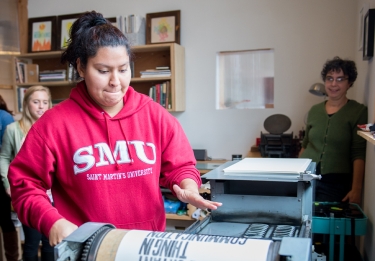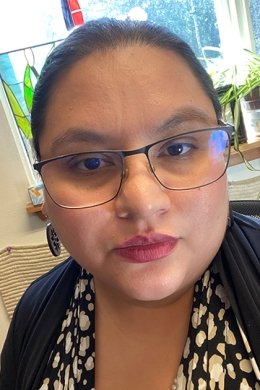
Communication Studies
Ready to turn your passion for digital media, journalism and film into a career in which you can impact the world and make a difference in your communities? Communication studies may be the best major for you.
Why Saint Martin's University?
Communication studies at Saint Martin's is an interdisciplinary program that uses critical and cultural studies to understand the central role of communication in society, with a focus on social justice. Shaped by the Benedictine values of stewardship, community, and listening, the program utilizes accessible media technologies to encourage creativity and build a solid foundation for a wide array of professional endeavors.
- Proximity to to Washington state capital allows for access to quality internship opportunities with government agencies, nonprofits, arts organizations, and businesses.
- Shaped by the Benedictine values of stewardship, community and listening with the ear of the heart, the program utilizes accessible media technologies such as cloud computing, mobile devices and social media, citizen journalism and digital media production to encourage creativity.
- While designed to provide a well-rounded understanding of the field of communication, students can choose to pursue a production-focused or more theoretically-oriented course of study.
Communication Studies Requirements
Details on courses, including university core requirements, can be found in the academic catalog.
- University core requirements
- Nine credit hours of lower-division courses
- 34 credit hours of upper-division courses
- Six credit hours of lower-division courses
- 19 credit hours of upper-division and elective courses
- Copy editing and design
- Digital journalism
- International communication
- Professional and academic writing
- Studies in film
Native voices is a 16 credit concentration within the communication studies major. It explores local and global Indigenous perspectives, with the goal of studying media and creating stories with a multidisciplinary lens and a focus on social justice.
Students achieving a Native voices concentration will:
- Use critical, decolonial and post-colonial theory to examine existing knowledge, values and assumptions about the Indigenous experience
- Obtain a diverse knowledge of human experience that centers on Indigenous perspectives, narratives and voices
- Unpack identities, intersectionality, privilege and power
- Develop the knowledge and skills to understand, integrate and utilize knowledge across disciplines to critique and challenge dominant colonial narratives in media
- Cultivate a voice to create new narratives and representation of the Indigenous experience
What can I do with this concentration?
The Native voices concentration prepares students for careers in a wide range of fields, from public relations and advertising to media arts production to work in the public sector and more. Graduates are also prepared to continue their studies in graduate school, specializing in the humanities, social sciences, public relations, digital media or filmmaking.
Native voices concentration requirements
Please note: Students wishing to have a study concentration or minor appear on their official transcripts are required to declare this concentration or minor with the Office of the Registrar at least one semester prior to degree completion. This concentration is for communication studies majors only.
Required courses include:
- COM 300: Media production (4 credits)
- WGES 200: Foundations of Race and Ethnic Studies (3 credits)
- Plus any three approved electives listed below.
Approved electives:
Students may take an elective that is not listed below if, in the judgment of the program director, it will significantly enhance their learning experience in the concentration.
- COM 385: Conflict and Peace Studies
- COM 396/SOC 396: Intercultural Communication
- COM 398: Media History: Native Film
- ENG 395: Indigenous Literature
- ENG 345: Literature, Race and Ethnicity
- ED 395: Indigenous Education
- ENV 395: The History of Elwha River
- HIS 435: History of Struggle for Justice
- PLS 395: Justice and Native American Experience (GIS395/CJ395)
- PLS 363: Race and American Politics
- PSY 375: Multicultural Psychology
- SOC 395: Settler Colonial Theory
- SJ 370/SOC 370: Social Action: Activism
Communication Studies at a Glance
- Degree
- Bachelor of Arts
- Program Type
- Major
- Minor
- Campus
- Main (Lacey)
- Type of Instruction
- In Person
- School
- College of Arts and Sciences
- Resources
- What can I do with this major?

 Outcomes
Outcomes
 Community
Community










